Toyota RAV4 vs VW Passat - Differences and prices compared
Compare performance (306 HP vs 272 HP), boot space and price (35100 £ vs 36500 £ ) at a glance. Find out which car is the better choice for you – Toyota RAV4 or VW Passat?
Costs and Efficiency:
When it comes to price and running costs, the biggest differences usually appear. This is often where you see which car fits your budget better in the long run.
Toyota RAV4 has a slight advantage in terms of price – it starts at 35100 £ , while the VW Passat costs 36500 £ . That’s a price difference of around 1328 £.
Fuel consumption also shows a difference: Toyota RAV4 manages with 1 L and is therefore somewhat more efficient than the VW Passat with 1.20 L. The difference is about 0.20 L per 100 km.
As for electric range, the VW Passat performs convincingly better – achieving up to 135 km, about 60 km more than the Toyota RAV4.
Engine and Performance:
Power, torque and acceleration say a lot about how a car feels on the road. This is where you see which model delivers more driving dynamics.
When it comes to engine power, the Toyota RAV4 has a a bit edge – offering 306 HP compared to 272 HP. That’s roughly 34 HP more horsepower.
In acceleration from 0 to 100 km/h, the VW Passat is barely noticeable quicker – completing the sprint in 5.80 s, while the Toyota RAV4 takes 6 s. That’s about 0.20 s faster.
In terms of top speed, the VW Passat performs clearly perceptible better – reaching 250 km/h, while the Toyota RAV4 tops out at 180 km/h. The difference is around 70 km/h.
Space and Everyday Use:
Whether family car or daily driver – which one offers more room, flexibility and comfort?
Both vehicles offer seating for 5 people.
In curb weight, VW Passat is somewhat lighter – 1573 kg compared to 1745 kg. The difference is around 172 kg.
In terms of boot space, the VW Passat offers a bit more room – 690 L compared to 580 L. That’s a difference of about 110 L.
In maximum load capacity, the VW Passat performs a bit better – up to 1920 L, which is about 230 L more than the Toyota RAV4.
When it comes to payload, Toyota RAV4 hardly perceptible takes the win – 600 kg compared to 577 kg. That’s a difference of about 23 kg.
Who wins the race in the data check?
The VW Passat holds a narrow overall lead in the objective data comparison.
This result only shows which model scores more points on paper – not which of the two cars feels right for you.
Costs and Consumption
View detailed analysis
Engine and Performance
View detailed analysis
Dimensions and Body
View detailed analysis
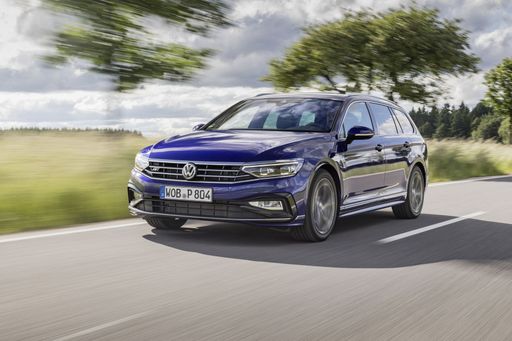
VW Passat
Toyota RAV4
The Toyota RAV4 feels like a sensible friend on the road, marrying dependable practicality with a dash of SUV personality that keeps daily driving from turning dull. Comfortable and easy to live with, it looks tough without shouting and quietly gets the job done — a sensible pick for buyers who want versatility without drama.
details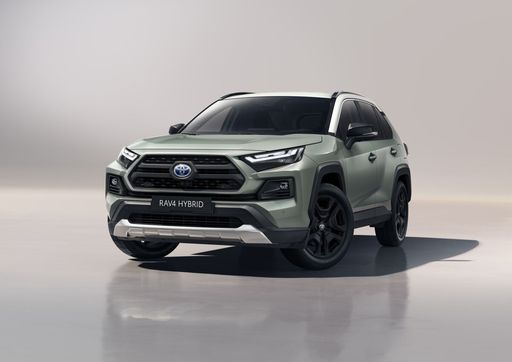
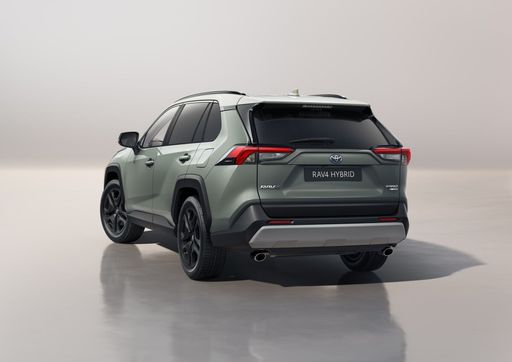
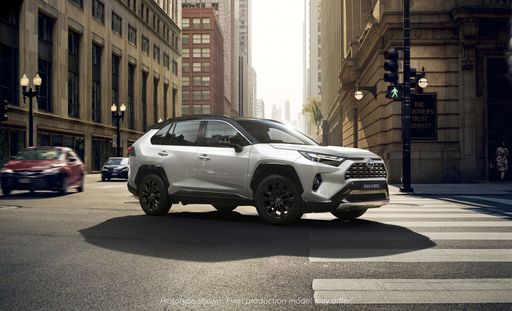
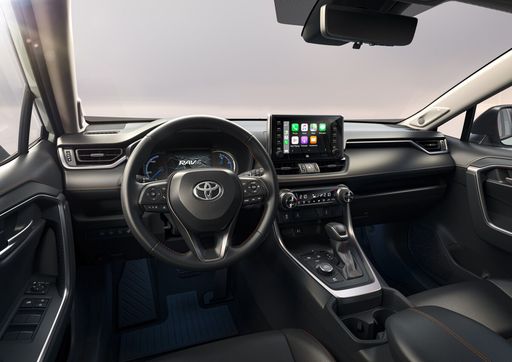
VW Passat
The VW Passat is the grown-up family car that gets the basics absolutely right — roomy, comfortable and built to handle weekday commutes and weekend getaways without fuss. It won't set your pulse racing, but its calm composure and sensible packaging make it boring in the best possible way: a dependable, no‑drama choice for buyers who value practicality over flash.
details
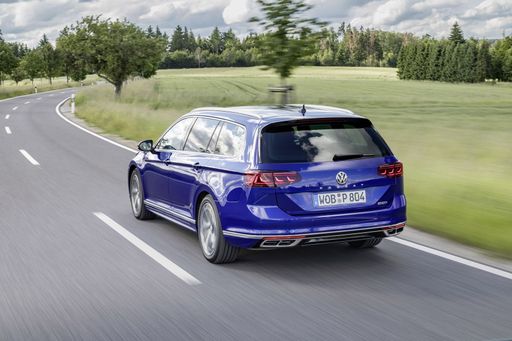
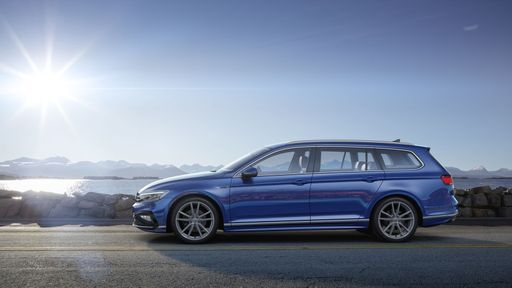
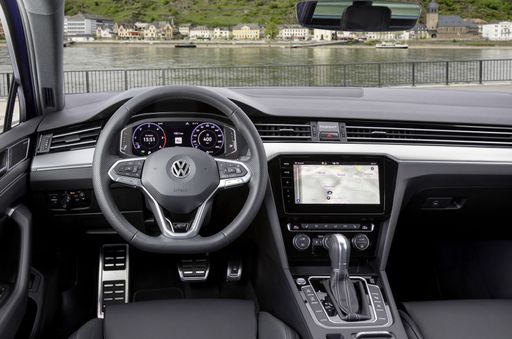
Costs and Consumption |
|
|---|---|
|
Price
35100 - 55700 £
|
Price
36500 - 58500 £
|
|
Consumption L/100km
1 - 5.6 L
|
Consumption L/100km
1.2 - 8 L
|
|
Consumption kWh/100km
-
|
Consumption kWh/100km
-
|
|
Electric Range
75 km
|
Electric Range
124 - 135 km
|
|
Battery Capacity
-
|
Battery Capacity
19.70 kWh
|
|
co2
22 - 128 g/km
|
co2
28 - 181 g/km
|
|
Fuel tank capacity
55 L
|
Fuel tank capacity
45 - 66 L
|
Dimensions and Body |
|
|---|---|
|
Body Type
SUV
|
Body Type
Estate
|
|
Seats
5
|
Seats
5
|
|
Doors
5
|
Doors
5
|
|
Curb weight
1745 - 1910 kg
|
Curb weight
1573 - 1858 kg
|
|
Trunk capacity
520 - 580 L
|
Trunk capacity
510 - 690 L
|
|
Length
4600 mm
|
Length
4917 mm
|
|
Width
1855 mm
|
Width
1849 mm
|
|
Height
1685 mm
|
Height
1521 mm
|
|
Max trunk capacity
1604 - 1690 L
|
Max trunk capacity
1770 - 1920 L
|
|
Payload
390 - 600 kg
|
Payload
501 - 577 kg
|
Engine and Performance |
|
|---|---|
|
Engine Type
Full Hybrid, Plugin Hybrid
|
Engine Type
Petrol, Petrol MHEV, Diesel, Plugin Hybrid
|
|
Transmission
Automatic
|
Transmission
Automatic
|
|
Transmission Detail
CVT
|
Transmission Detail
Dual-Clutch Automatic
|
|
Drive Type
Front-Wheel Drive, All-Wheel Drive
|
Drive Type
All-Wheel Drive, Front-Wheel Drive
|
|
Power HP
218 - 306 HP
|
Power HP
122 - 272 HP
|
|
Acceleration 0-100km/h
6 - 8.4 s
|
Acceleration 0-100km/h
5.8 - 10.7 s
|
|
Max Speed
180 km/h
|
Max Speed
212 - 250 km/h
|
|
Torque
-
|
Torque
250 - 400 Nm
|
|
Number of Cylinders
4
|
Number of Cylinders
4
|
|
Power kW
160 - 225 kW
|
Power kW
90 - 200 kW
|
|
Engine capacity
2487 cm3
|
Engine capacity
1498 - 1984 cm3
|
General |
|
|---|---|
|
Model Year
2024 - 2025
|
Model Year
2024 - 2025
|
|
CO2 Efficiency Class
D, B
|
CO2 Efficiency Class
G, D, E, B
|
|
Brand
Toyota
|
Brand
VW
|
What drive types are available for the Toyota RAV4?
Available configurations include Front-Wheel Drive or All-Wheel Drive.




